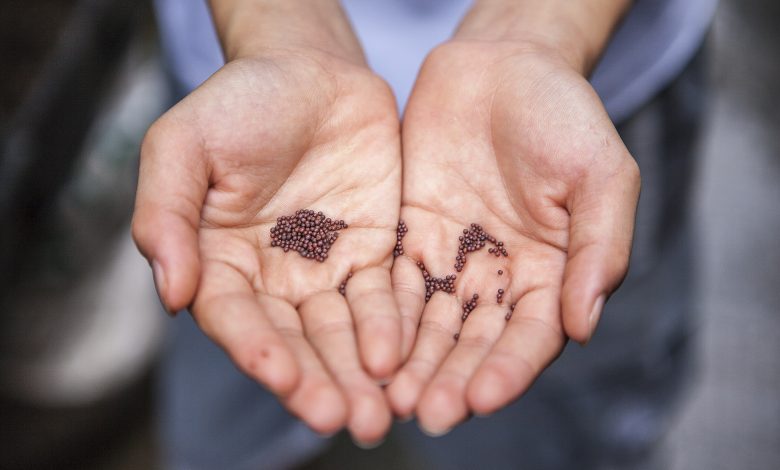The Parable of the Mustard Seed and How It Relates Today

The parable of the mustard seed is one of the shortest parables anyone will come across. Its message is simple: even a tiny seed can grow into a towering tree with enough time and care. The call to action for us in our modern financial world is no different than it was to the farmers hearing this story. Plant a seed, no matter how small, and plant it early enough that you can discover what the seed grows into when it matures.
Parable of the Mustard Seed
The parable appears in multiple books throughout the Bible, and the first excerpt goes like this:
He set another parable before them, saying, “The Kingdom of Heaven is like a grain of mustard seed, which a man took, and sowed in his field, which indeed is smaller than all seeds. But when it is grown, it is greater than the herbs, and becomes a tree, so that the birds of the air come and lodge in its branches.” – Matthew 13:31-21, World English Bible
Of course, not every seed you plant will grow into a bountiful tree. You must plant many little seeds continually to ensure that your garden eventually blooms with multiple flowering trees.
When applied on a financial level, these seeds can be representative of various investments. One seed may be your Roth IRA, while other seeds may sit in a brokerage account in the form of stocks and bonds.
Taking a diversion from finance, these seeds can also be representative of many situations people find themselves in throughout life. A seed could be a conversation you strike up with someone on a whim that eventually turns into a lasting friendship.
But in order to see your seeds grow into flowering maturity, you must care for them and have the patience to let them grow. You must also plant the seeds on fertile grounds and be prepared to face adversity along the way.
The parable of the mustard seed comes after two longer parables that include additional lessons centering around the adversities you may face. The consequences of your choices during these times will have lasting effects on the outcome of your crop. The first of these is another parable of a farmer planting seed in three different scenarios.
Parable of the Harvest
The first is the seed cast in gravel. This represents someone who instantly responds with enthusiasm. But once difficulties arrive, the enthusiasm dries up and evaporates. To apply this story to the modern day, the lesson is to not become discouraged upon the first sign of difficulty or volatility. You must be prepared to ride out the rough times and keep faith in your investments.
The second seed is cast in the weeds. This seed represents someone that becomes too greedy with their investments and strangles the seed before it has time to grow. The application here is to make sure you stay balanced and under control with your investments.
The final seed is cast on the earth. This seed represents “the person who hears and takes in the news, and then produces a harvest beyond his wildest dreams.” The application here is to make your investments in sound and responsible areas. With patience, you will eventually reap your rewards.

Taking Advantage of Adversity in the Market
There is one final parable that comes before the parable of the mustard seed, and that describes a farmer who has his crop attacked by enemies. After placing down good seed on solid ground, enemies of the farmer come in the night and sow thistles throughout the wheat. When the first signs of the growing wheat appeared, so did the thistles.
The farmhands working on the field related the surprising news to the farmer, wondering if they should weed out the thistles. This type of adversity can be related to the stock market crashing, and panicked investors wondering, “Should I cash out my investment now before it tanks even more?”
To the question of whether to weed out the thistle, the farmer responded, “No, if you weed the thistles, you’ll pull up the wheat, too. Let them grow together until harvest time. Then I’ll instruct the harvesters to pull up the thistles and tie them in bundles for the fire, then gather the wheat and put it in the barn.”
The application here is that even when adversity strikes, you still have the opportunity to make the best out of the situation. Rather than weeding out bad investments by doing a full-scale selloff of your investments in trying times, use this as an opportunity to take advantage.
With the drop in the stock market, interest rates have plummeted. That means that high-yield savings accounts are no longer providing anywhere near the yield they use to be. Your savings account that had been delivering a 1.8% interest rate may now be down to 1% or lower. That means your money can be better used in another area.
Savvy investors don’t mind when the stock market crashes. It just provides the opportunity to buy low. Investors call it “buying the dip.” Despite the adversity you encounter, there is still a way to turn that adversity to your advantage.

Bottom Line
In order to plant your seeds and grow a harvest that will last you for life, you must have a plan in place and the patience to see it through. It’s impossible not to talk about the company Acorns when discussing these parables because their entire marketing and business model is based on this type of story.
Acorns calls it “growing your oak.” An acorn seed may start small, but eventually, it grows into one of the largest and most durable of trees. Acorns makes it easy to invest small amounts at a time by rounding up your purchases and adding them to your account where they are automatically invested for you.
The bottom line is that no matter what phase of life you’re in, you should be planting seeds to be sown for the future. No matter how small, they can eventually grow into a harvest beyond your wildest dreams.



